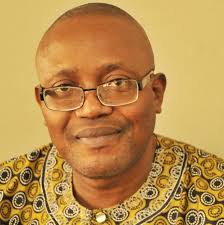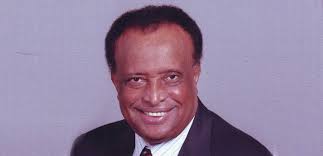Late Ambassador Walter Carrington.
 Comrade Owei Lakemfa.
Comrade Owei Lakemfa.
By Owei Lakemfa.
One of the most dangerous periods in our history was from 1995 to 1998 when the usurper, General Sani Abacha, bared his fangs. He detained without trial, maimed and killed patriots without batting an eyelid. In fact, he maintained death squads, the most infamous being the so-called Strike Force.
At least a dozen journalists were imprisoned or detained. One of them, Bagauda Kaltho never returned. Until date, the Abacha Boys have not revealed where Kaltho is buried so that his remains can be returned to his family for proper burial. It was a period people like Chief Alfred Rewane and Mrs. Kudirat Abiola were shot dead and men like Senator Abraham Adesanya and former Minister and Publisher of The Guardian, Alex Ibru, survived the bullets of assassins. The writer, Ken Saro-Wiwa and eight of his fellow Ogoni environmentalists had been hung back in November, 1995. Despite such bestiality, and many in exile, resistance went on.

In 1996, a few of us established an organisation with the primary purposes of keeping the issue of political prisoners, including those sentenced for alleged coup plotting, on the front burner. We strived to maintain contact with them, organise activities for their families, especially their children, and run activities drawing attention to their plight. One of our aims was to pile pressure on the Abacha regime to release these people, including General Olusegun Obasanjo, the lawyer Ebun Adegboruwa and his father, Chief Olu Adegboruwa and the academic, Professor Jide Oshuntokun who were hostages of the evil regime. We called the organisation, Free Beko Kuti Campaign Committee, named after the pro-democracy leader who was serving 15 years at the Kaduna Central Prison. We also ran a flagship quarterly newsletter.
The organisation had a small but diverse membership, including gentleman lawyer, Tope Egunjobi, banker turned book publisher, Muthar Bakare and journalist, Femi Ojudu (later senator) who was later detained by the Abacha regime. There were lots of risks involved but we did not lack courage. Our standing visitation team comprising Ms. Nike Ransome-Kuti, the lawyer, Olajide Bello and his medical doctor wife, Abosede Afolabi; the quite resourceful printer, farmer and veteran of detention spells, Akanni Iromini and I, one day decided to visit the journalist, Ben Charles Obi. He was in solitary confinement at the Agodi prisons, Ibadan. We had received reports that he was in low spirit and thought we could raise his spirit with a visit. But as a political prisoner, he was not allowed visits. However, as a Christian, pastors could have access to preach to him. So one Sunday, we left Lagos, with one of us dressed as a preacher, to see him.
The then American Ambassador Walter Carrington supported and encouraged the Committee. Once, we decided to hold a photo exhibition and talks about the political detainees. We knew we could not get a public place or hotel as venue, so we held it in the Imaria Street, Anthony Village, Lagos home of Dr. Ransome-Kuti. Committee member, Comrade Uba Sani (now a serving senator) came in from Kaduna. He had been quite passionate about Comrade Shehu Sani (later senator) who was serving time in Aba Prisons for alleged treason.
Shehu Sani was also sick and the newly established Abia State University Teaching Hospital, ABSUTH, did not have the required facility to treat him; yet the regime would not permit the prison officials to take him to an equipped hospital.
So Uba Sani handled the part of the exhibition on Shehu Sani, Major General Shehu Yar’Adua (who eventually passed on or was killed at the Abakaliki Prisons) and the then 74-year-old deposed Sultan of Sokoto, Alhaji Ibrahim Dasuki. As the exhibition commenced, we expected Abacha’s goons to attack. Suddenly, there was some commotion on the street; we expected the invaders, but who turned up? Ambassador Carrington! We felt some relief.
We knew with Carrington, the serving ambassador of the most powerful country on earth in our midst, the invaders would need to seek top security clearance to attack the venue. The regime merely sent a low flying helicopter to hover above the venue. Carrington listened to the talks, held discussions with the families of some of the detainees and went round our makeshift stands.
On an occasion, he invited me to his residence for private discussions. In a moment of indiscretion, I mentioned a project I was carrying out with another group for which we needed his assistance. He gesticulated he did not hear me and walked out into the garden. I got the message: the four walls of the residence could not be trusted to keep a secret.
Carrington, an Africa-American was so much pain to the Abacha regime that it ‘imported’ some African-American leaders to counter him and give the regime some credibility. One of the imports was Senator Carol Elizabeth Mosley-Braun who represented Illinois. In 1996, she paid ‘a private visit’ to General Sani Abacha praising him. She returned to America to praise and defend on the floor of the American Congress, the human rights records of the Nigerian butcher.
That same year, Nation of Islam leader, Louis Farrakhan, was brought on a six-day visit to Nigeria. He pleaded with Nigerians to allow General Abacha three more years to perfect his transition to Civil Rule Programme which was actually to let Abacha transform to a civilian dictator. As part of the charade, the regime allowed Farrakhan to visit Chief Moshood Abiola in detention. That did nothing to remove the stains from Farrakhan’s garment of honour.
Two years later, the Abacha regime renamed Eleke Crescent on which the American Embassy was situated, after Farrakhan. But a few months later, Abacha died and the elected Senator Bola Ahmed Tinubu government of Lagos State once again, renamed the street, this time, deservedly, after Walter Carrington.
Carrington was committed to democracy, fundamental human rights and the emancipation of the African people. It was a commitment that went far beyond his official brief as the American Ambassador to Nigeria, a tour of duty he completed in 1997. As he prepared to depart, pro-democracy groups and leaders decided to give him a befitting send forth in the home of Pa Ore Onasanya. But Abacha’s goons invaded the venue and the party was shifted to the home of Chief Ayo Adebanjo, another opposition leader. With the social party in full swing, Abacha’s security forces attacked, but Carrington cared less as he continued dancing. The attackers were running dogs, but they knew better not to bite the American ambassador.
He married a Nigerian, Arese Carrington and was given a Yoruba name, Omowale, literally, that the child has returned home. On Tuesday, August 11, 2020, at 90, Walter Omowale Carrington made an eternal return home.




GIPHY App Key not set. Please check settings